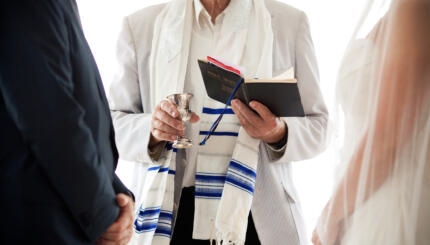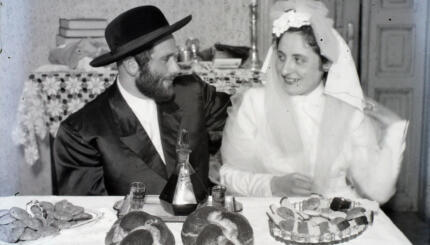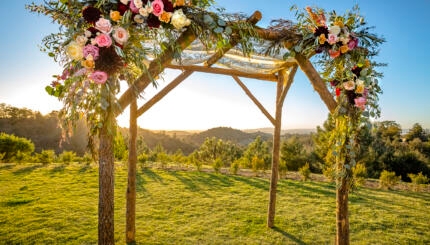I have been an active participant in a group of Muslims, Christians and Jews that meets two to three times a year for presentations and dialogue. All of us would define ourselves as active religious practitioners. Our conversations have moved into areas of genuine dialogue and have space for disagreements and different views from both within our religious traditions as well as between religions. In other words, we have begun to trust each other.
Our meeting last week looked at the question of interfaith marriage. I was asked to be the Jewish presenter and a Catholic priest and Muslim chaplain at a local university presented their traditions.
What I found fascinating was that the priest, although an expert in canon law, approached the question from a pastoral care perspective. He clearly saw the couple and the success of their marriage as his desired outcome. The Muslim presenter gave a legal discourse and argued that while Muslim law allowed men to marry Christian and Jewish women, the reverse was not accepted. She argued that this should not be the case and that Muslim women should be allowed to marry Christian or Jewish men, citing a number of contemporary Muslim authorities. Parenthetically, at my table during conversation one of the Muslim participants commented that most Muslims would not find the contemporary authorities cited as being authoritative. This certainly has its parallels in contemporary Jewish legal debates and sounded very familiar to me as an Orthodox rabbi. My primary focus was a theological argument why Jews should marry other Jews. It was not intended to be an argument against interfaith marriage which would be silly and futile for reasons that my readers surely understand. Rather the primary focus was on understanding Jewish Peoplehood in theological/legal terms and how one’s decision whom to marry might be shaped by this understanding.
This is what I said:
“Jews stand in relationship to God as members of the covenant. In the Bible, this covenant while it begins in the Bible with Abraham and Sarah, the Jewish people as a nation enter into this covenant at Mount Sinai when they receive and accept the Torah and it is reaffirmed forty years later in the Book of Deuteronomy before the death of Moses.
“You are standing, this day, all of you, before the Lord your God – the leaders of your tribes, your elders, your officers, every Jewish individual; your children, your wives, the strangers in the midst of your camp, from the hewers of wood to the drawers of water; to bring you into the covenant of Lord your God and His oath, which God is making with you today.
In order to establish you today as a nation unto Him, and He shall be your God, as He told you; and as He promised your fathers, Abraham, Isaac, and Jacob.
And not only with you alone am I making this covenant and this oath; but rather, with those that are here with us standing today before the Lord, our God, and with those THAT ARE NOT HERE WITH US TODAY.” (Deut. 29, 9-11).
This Deuteronomy passage reaffirms the covenant that began in Genesis with a family, continued in the Book of Exodus as a nation at Sinai-thus the reference to be your God, and then adds with those who are not here today. This is understood to include all those not yet born. Covenant is rooted in family and peoplehood. It is not a relationship made with a single individual qua individual, but with a family and then a nation.
The next passage from the Mekhilta, a third century rabbinic text, builds on this and elaborates on the implications of this covenant relationship.
“Rabbi says: This proclaims the excellence of Israel. For when they all stood before Mount Sinai to receive the Torah they all made up their mind alike’ to accept the reign of God joyfully. Furthermore, they pledged themselves for one another. And it was not only concerning overt acts that God, revealing Himself to them, wished to make His covenant with them but also concerning secret acts, as it is said: “The secret things belong to the Lord our God’ and the things that are revealed,” etc. (Deut. 29.28). But they said to Him: Concerning overt acts we are ready to make a covenant with You, but we will not make a covenant with You in regard to secret acts lest one of us commit a sin secretly and the entire community be held responsible for it.”
Now this passage is seen as a dialogue between God and the people. God makes a covenant, but the implications of the covenant are that that the people are responsible one for another and therefore accountable when people sin and transgress. Here the people agree to that but with one limitation, it only applies to public transgressions. How can I be responsible for something someone has done in private? God agrees and therefore a text from Deuteronomy 29 is quoted that secret acts belong to God, but revealed public acts are the responsibility of the people.
Now this understanding creates the principle of “All Jews are responsible one for another, kol yisrael arevim zeh bazeh”. Now this was not understood as only responsibility and accountability on a social level, but as a metaphysical construct of creating a religious sense of peoplehood. Let me describe how this plays out. For example, before I eat I am required to make a blessing over the food. It is quick and usually all of 7-9 words. However, Friday night for example in my home before we eat the bread at the Sabbath dinner only my wife makes the blessing and everyone answers Amen. Now if it is my responsibility to say the blessing, how can my wife recite it for me or the others at the table? The answer is we share this covenantal peoplehood bond, and her reciting of it is as if I have done it as well. We are linked together in the performance of commandments.
You can see this also in the Jewish wedding ceremony. This is the last blessing recited at the wedding ceremony.
“Blessed are You, Lord our God, King/Ruler of the universe, who created joy and happiness, groom and bride, gladness, jubilation, cheer and delight, love, friendship, harmony and fellowship. Lord our God, let there speedily be heard in the cities of Judah and in the streets of Jerusalem the sound of joy and the sound of happiness, the sound of a groom and the sound of a bride, the sound of exultation of grooms from under their huppah, and youths from their joyous banquets. Blessed are You Lord, who gladdens the groom with the bride.”
The wedding ceremony is not only about my joining in marriage with another person, but it also means we share the same vision. The vision of redemption in this blessing is the vision of a redeemed people, and a wedding is the manifestation of that redemption. The prophet Jeremiah whose words are paraphrased here sees weddings as sign of the redemption and in getting married my wedding is a foretaste, a hint, a statement of faith, of the redemption of my people And this redemption is not a spiritual redemption of the soul, but a physical, in history redemption of a people into an ideal political, spiritual life. Weddings here are not a metaphor of redemption, but an expression of it. Under the huppah, the wedding canopy, is this affirmation of peoplehood, again not a social construct, but a religious entity.
Finally, the vehicle, the institution for teaching the faith, but more importantly for living Judaism is not the synagogue, although it is needed and important, but it really is the family. Shabbat is observed at my table, I transmit and teach my children at the Passover Seder centered around my table. My table is an altar and the Temple, long destroyed, is recreated in my home. It is around this table that I teach my children. In particular we see this at Passover and Deuteronomy 6 is an important text of the Seder. “If your son asks you in time to come, saying, “What are the testimonies, the statutes, and the ordinances, which the Lord our God has commanded you?”. You shall say to your son, “We were slaves to Pharaoh in Egypt, and the Lord took us out of Egypt with a strong hand. (Deuteronomy 6:20-21)
My child asks what does this mean to you and I answer we. It is not about me and you, but about us. Our religious identity is centered in our we, being part of the people who stood at Sinai and we are in covenant with God. And it is that sense of we that I transmit to my family in the holy moments we gather in family.
This is why I married a Jew, this is why I want my children to marry Jews, and I cannot simply imagine sharing this covenantal responsibility and bond with someone who is not part of the people who share this consciousness. I cannot imagine having the deepest most intimate relationship with someone with whom it is only me and you and not we, sharing a sense of covenantal peoplehood. Can I fall in love with someone outside my faith who is a wonderful person in all the right ways, yes. Can I have a successful marriage, very possibly yes. But can I share a common religious bond, common religious language, stand as covenantal partners reaffirming Sinai and transmitting this consciousness? Here I would answer in the negative.”
What do you think?
Shabbat
Pronounced: shuh-BAHT or shah-BAHT, Origin: Hebrew, the Sabbath, from sundown Friday to sundown Saturday.
Torah
Pronunced: TORE-uh, Origin: Hebrew, the Five Books of Moses.



